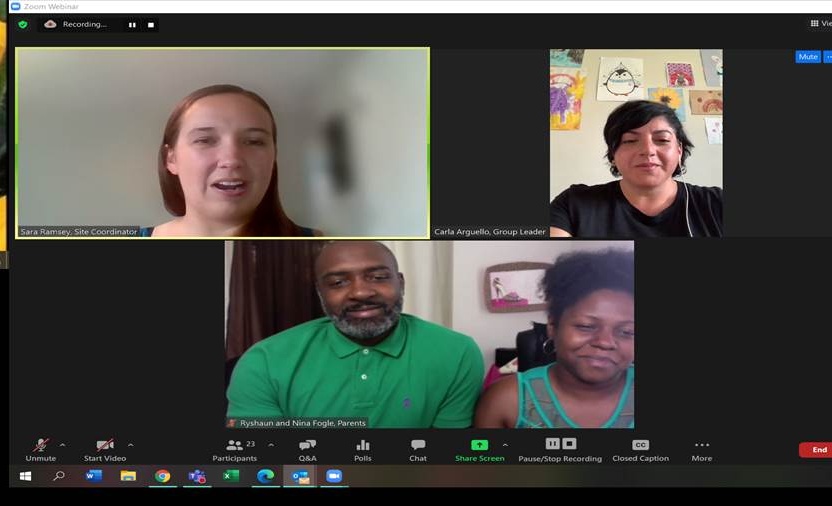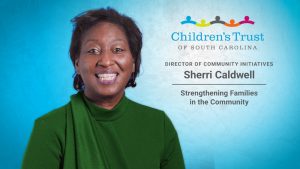A recent virtual event, Evening with the Experts, brought together a Strengthening Families Program site coordinator and three parents who have completed the program to explain why it’s so effective at making positive changes in the lives of families.

Sara Ramsey, Carla Arguello, and Ryshaun and Giovanninna Fogle discuss the merits of the Strengthening Families Program.
Ryshaun Fogle came away from his participation in the 14 sessions of the Strengthening Families Program (SFP) with a keen appreciation for the lessons learned on how to build bonding and communications skills within his family.
But he really marveled at the connections made with the other families that went through the program with his family at the Red Bank Elementary site in Lexington County, one of 32 counties in South Carolina where Children’s Trust implements SFP through local partners.
“SFP genuinely felt like a family to me,” Ryshaun said. “They (the fellow families) have been great for us. It’s great learning best practices from other families.”
Fogle’s wife Giovanninna concurred with that assessment of the program and what it meant to their family life with four children.
“I enjoyed the community aspect,” she said. “That was helpful and comforting, learning and sharing the stories.”
The Fogles were speaking at a recent Evening with the Experts virtual event. Children’s Trust CEO Sue Williams hosted the online conversation to give the organization’s supporters greater insight into the programmatic work to prevent child abuse and neglect.

Sherri Caldwell, Children’s Trust director of community initiatives, gave an overview of the program to start the evening. It serves families with children ages 6 to 11 through local partners in settings that include community centers, schools, and churches. The evidence-based program is designed to help families develop positive discipline practices, stay resilient in tough times, reduce conflict, improve parenting skills, and assist children with social skills, relationships, and school performance.
Children’s Trust, with funding from The Duke Endowment and the S.C. Department of Social Services, provides training for partners, collects data, and monitors the program to ensure it reaches the maximum potential for children and families as part of its overall mission to prevent child abuse and neglect in South Carolina.
SFP, which typically has 8 to 12 families in a single cycle, features two-hour weekly sessions that begin with a family meal before splitting into parenting classes and child classes. Everyone comes together again as a full group to practice new skills at the end of each evening. Families put these lessons into practice at home before the next week’s session.
Over the past year due to the COVID-19 pandemic, local partners transitioned SFP to virtual platforms, but some sites have begun to return to in-person delivery of the program.
SFP Provides Proven Strategies to Build Family Bonds
Sara Ramsey, the SFP site coordinator for Lutheran Services Carolinas in Charleston who served as the moderator of Evening with the Experts, called her organization’s embrace of the program three years ago a salvation for families in their community.
“It was prayers answered,” she said.
After watching the cyclical nature of child maltreatment, Lutheran Services Carolinas staff members understood how important a program was needed that supported families and offered proven strategies to create positive interactions in home life.
“We jumped on it (SFP) and have gone full-steam ahead,” Ramsey said. “To see the changes and the skills-building (in families) is phenomenal.”
Carla Arguello, who completed the program with her daughter Sofia,
loved it so much that after her 2019 SFP graduation, she instantly knew that she wanted to help other families enjoy the same experience. She joined the SFP team of Just Say Something, an Upstate grantee of Children’s Trust, to work as a group leader in the program.
She emphasized the importance of adopting a more positive tone with your children, building a stronger relationship with them, and finding a way to create uplifting moments that they’ll appreciate and remember.
“It’s not (just) about time spent. It’s about a quality experience in the time you do spend with them,” Arguello said.
Positive Encouragement and Rewards Make a Difference
The parents also pointed out the significance of providing clear directions to ensure parents stay on the same page as their children when it comes to expectations. Rewarding them for positive achievements, from schoolwork to household chores, can lead to better behavior. Those rewards don’t have to be monetary; they can be as simple as giving extra hugs, handing out ice cream, or allowing them more freedom to make their own decisions.

PowerPoint presentation offered a child’s viewpoint on the program.
Ramsey showed a PowerPoint presentation by 9-year-old Quetzalli, a recent SFP graduate with her mother Else Gantt from the Red Bank site, that detailed what the lessons that she learned in the program meant to her. Ramsey called the presentation – which Quetzalli did on her own – “an absolutely beautiful representation of the program and how it helped her family.”
Each slide represented a different element of the program, including communications skills, social skills, utilizing patience, rewarding good behavior, staying out of trouble, talking to get help, problem solving, recognizing feelings, understanding criticism, and handling anger.
All three parents commented on how the regular family meetings encouraged by SFP have aided communications, given clarity to upcoming commitments and planned activities, and offered opportunities to discuss what’s happening in their lives.
Ryshaun Fogle said the program has helped him relate more positively to his children and put into perspective the necessity of giving them guidance and direction. Giovanninna Fogle added that it has helped not just with her children but in her marriage as well.
“I don’t know where we would be today without it,” she said. “It was a life-changing experience.”
Arguello considers herself a true advocate for SFP as she encourages other families to enroll.
“I truly believe in the program,” she said. “If you follow the tools, you will see results.”





